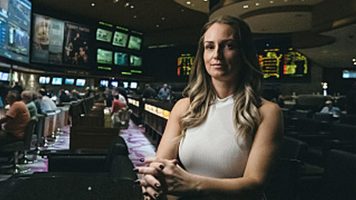
I know a few people who bet on sports a lot. I also know a couple of guys who take a lot of bets on sports. I thought about all of them watching a preview of the new Showtime documentary series, “Action,” which debuts Sunday night (3/24).
The cameras follow exactly the kind of characters you’d expect even if you knew nothing about this world:
- There’s the sports handicapper Kelly Stewart (pictured above), who’s making a name for herself in Vegas and on YouTube because of both her knowledge and her looks (she’s more than willing to allow the cameras access as she gets her face worked on, and worries that, at 35, she has only a few years left to be successful).
- There’s a professional sports bettor who has no interest in watching the games, only knowing the scores, because he’s sure he and his crew have it all worked out ahead of time on their laptops.
- There’s the really high stakes bettor who gets comped a casino’s huge suite — a courtesy that probably wouldn’t be extended to him if he were really beating the book as much as he says he is.
- There are veteran faces like Brent Musberger, who hosts a wagering show from a Vegas casino, Jimmy Vaccaro, one of the best known sports book managers and handicappers in Vegas history, and (Jimmy Kimmel’s) Cousin Sal, who’s part of a prognosticating podcast.
- There’s the loudmouth tout Vegas Dave, who claims his picks win 75% of the time — which everyone else interviewed on the show says is impossible, that getting even 56% of them right is a pretty remarkable record (because of the juice, the vigorish, the 10%+ that bookies and legitimate sports books charge, you have to win more than 52% of the time to do better than break-even). This guy is a real piece of work, who may be good at hyping himself and convincing people to pay for his Best Bet Of The Year (seemingly issued weekly), but in reality has had to be propped up financially by his elderly parents, who may be his only friends.
What none of these characters offer is any proof of their success. Perhaps they really are winners, but don’t want to divulge to the IRS how much they’re taking in. Or, more likely, they’ve had a good run here and there, but can’t point to their honest track record because it wouldn’t match the image they present. Without accountability over the long term, I don’t believe any of their claims.
Then there are the regular Joe Schmoes, the amateurs — the squares, as they’re known — who don’t know anything about stats, but bet teams just because they like them. In some cases, they’re just tourists who are willing to risk a little bit of money to make watching 9 NFL games at once a little more interesting.
That’s the category I fall into each October, when my brother-in-law Stuart and I go on our annual Vegas jaunt, during which we eat well, play many hours of poker, and reserve our Sunday morning for lots of football action upon which we’ve wagered a few hundred bucks, tops. Neither of us has any real idea what we’re doing, so our bets are purely speculative and never worth sharing with anyone else. We’re undoubtedly long-term losers, but view that money as the expense for enjoying the moment together, which is probably the best way to think of any gambling, as money that won’t change our lives either way.
The show delves into the growth of legalized sports betting in other states besides Nevada, starting with New Jersey but already spreading to others (naturally, Missouri is not at the forefront, but will probably join the pack in the next few years). Those states are desperate for the tax revenue generated by allowing legitimate outlets to book those bets — wagers that are already being taken illegally by bookies and offshore websites, with amounts reaching into the billions.
“Action” includes an interview with a bookie who’s been in the business for more than 20 years, who’s not afraid of losing business to legal sports books, because he has one advantage they’ll never have — he extends credit to his customers. In a sports book, you can’t make a bet without putting your cash on the counter, but with a bookie, you can make the bet today and pay him tomorrow when you lose.
To its credit, “Action” also includes detractors who cite the damage legalized gambling can do. They make some good points, but I detest any government regulation that tells Americans what we can do with our own money. We saw that shortsightedness here in Missouri until 2008, when voters tossed out the state’s ridiculous “loss limit” (an issue I wrote about extensively in this piece). As I’ve pointed out before, there’s no limit to the number of tickets you can buy for the lottery (maybe because it’s run by state governments?) or for a Cardinals baseball game. You can buy as many cars or bracelets or tattoos or smartphones as you want — you can even wager as much and as often as you like in slot machines or at the blackjack tables, so why not on sports?
I have only seen the first two episodes of “Action,” which offers a fairly well-rounded view of the sports betting world. I’m interested to see how the rest of the series plays out — and if the show gets honest about who’s really winning (those taking the bets) and losing (those making the bets).
